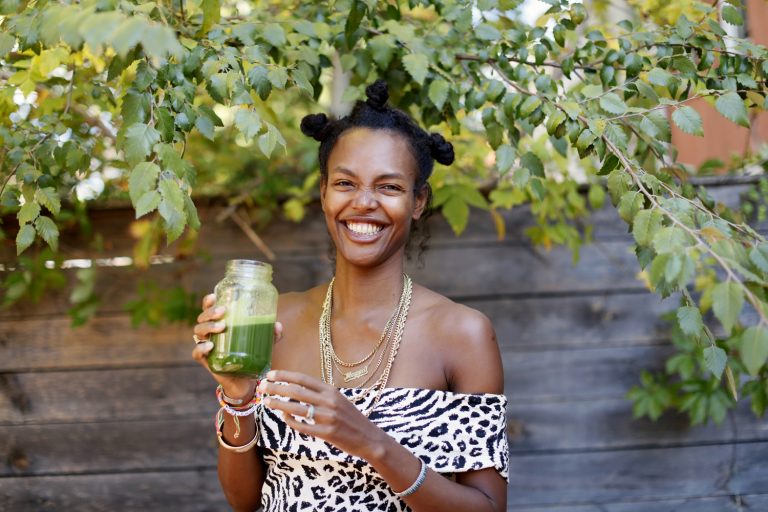
As we celebrate Black History Month, now is a timely opportunity to reinvigorate our commitments to activism. For me, that means intentionally supporting Black creatives in everything I do. I’ve doubled down on reading more Black authors, supporting Black creatives on Instagram, and filling my beauty shelf with no shortage of Black-owned beauty brands. Being purposeful about focusing on Black-owned brands always reminds me of the vibrant diversity that exists in the beauty space. Though unfortunately, much of it often goes unnoticed.
The best way to bring awareness to cool brands with fascinating stories is to talk about them. A lot. I send skincare recommendations to my friends, crowdsource advice from my group chats, and solicit opinions on my Instagram stories. I’ve found that the products I’m most excited to share aren’t just the trendy buys with pastel packaging. Instead, I value the ones with stories that resonate with me—and many of those are often Black or POC-owned.
It’s a common story: Black beauty founders starting new ventures because they were sick of being ignored by the industry. I’m always inspired by founder who decided to create the products they wanted to see themselves. They’re each filling a gap that has been ignored by mainstream skincare for too long, and thanks to their work and vision, my list of favorite product discoveries continues to grow. Full disclosure: These aren’t just placebos in pretty packaging. They have powerful ingredients which ease the frustrations of marginalized beauty lovers and fill the gaps for other consumers as well.
Feature image by Belathée Photography
Through my many experiments with different products and ingredients, I learned that shopping for your unique skin is key. What I’m only just realizing is how much my skincare and beauty routines benefit by shopping from brands made by and for people who look like me. To get a full picture of what it means to shop specifically for darker skin, I spoke to Dr. Michelle Henry, a dermatologist in New York City.
What is melanin?
Melanin is a pigment in the skin which determines skin color. Dr. Henry explains it further, saying that “Everyone independent of their skin color has the same number of melanocytes. However, those with darker skin have more melanosomes that are packed with more melanin.”
What concerns are common in darker skin?
Hyperpigmentation and melasma are common concerns for anyone with darker skin. Because darker skin is more packed with melanin, dark spots are more frequent and often harder to fade. “Any condition with excess pigmentation may be seen more commonly or present more severely in patients with darker skin types,” Dr. Henry adds.
What causes hyperpigmentation? What can you do about it?
To help combat these dark spots, it’s important to know where they come from. Dr. Henry breaks it down: “There are many types of hyperpigmentation. The most common is post-inflammatory hyperpigmentation (PIH), which is hyperpigmentation after any inflammatory trauma. Trauma can be from acne, a laceration to the skin, and even eczema.” Melasma is another type, found mostly in women and caused by hormonal changes.
For both types, Dr. Henry emphasizes the importance of wearing sunscreen. “Protecting the skin from UV light is a significant way to reduce excess melanin production,” she tells me.
In darker skin, the higher concentration of melanin means more frequent dark spots. Black-owned beauty brands to the rescue.
What are the best ingredients to treat hyperpigmentation?
When I first started navigating my own journey with hyperpigmentation, it took weeks before the term was even mentioned. I shopped for products that were supposed to help with acne scars, but many addressed texture rather than discoloration, and most were too weak to fade my scars. Over the past few years, the term hyperpigmentation has come into the common lexicon, and more products have emerged to treat it.
Some ingredients are better than others. “I love ingredients like azelaic acid, kojic acid, niacinamide, hydroquinone, glycolic acid, and retinoic acid to help lighten dark spots in darker skin tones,” Dr. Henry recommends. “Most ingredients take anywhere from four to twelve weeks to see significant improvement.”
While we have a long way to go for complete inclusion, I’m encouraged by the progress the industry is already making and excited about the products I’ve found so far. From hair oils to scar-erasing creams, here is a roundup of my favorite Black-owned beauty brands and the inspiring stories behind them.
Meet the Black-owned beauty brands your skincare routine needs.
Please share your recommendations for other Black-owned beauty brands you know and love!